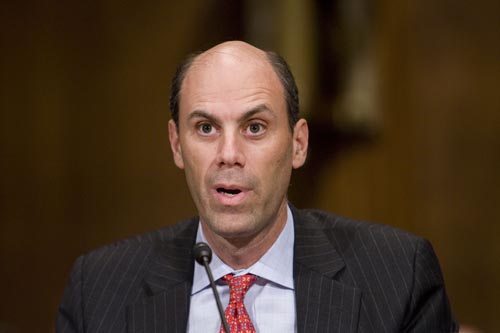US District Judge Denies Motion to Overturn Election

James E. Boasberg, during his confirmation hearing, before the Senate Judiciary Committee, to be United States District Judge for the District of Columbia. September 15, 2010. Photo by Diego M. Radzinschi/THE NATIONAL LAW JOURNAL.
LANSING — In a spirited opinion, US District Judge James E. Boasberg of the DC District Court today denied plaintiffs’ motion for a preliminary injunction in Wisconsin Voters Alliance et.al. v Vice President Michael R Pence et.al. Boasberg’s opinion concluded by saying that “the plaintiffs have established no likelihood of success on the merits here …”
In his opinion, Judge Boasberg said: “Plaintiffs’ aims in this election challenge are bold indeed: they ask this Court to declare unconstitutional several decades-old federal statutes governing the appointment of electors and the counting of electoral votes for President of the United States; to invalidate multiple state statutes regulating the certification of Presidential votes; to ignore certain Supreme Court decisions; and, the coup de grace, to enjoin the U.S. Congress from counting the electoral votes on January 6, 2021, and declaring Joseph R. Biden the next President.”
The action by voter groups and individual voters from the states of Wisconsin, Michigan, Pennsylvania, Georgia and Arizona was brought against Pence in his capacity as President of the US Senate, both Houses of Congress and the Electoral College itself, and several leaders of the five named states.
At the same time they filed their complaint, the plaintiffs also moved for a preliminary injunction that would enjoin the certifying of the electors from the five states and the counting of their electoral votes. The judge noted that: “In addition to being filed on behalf of Plaintiffs without standing and (at least as to the state Defendants) in the wrong court and with no effort to even serve their adversaries, the suit rests on a fundamental and obvious misreading of the Constitution. It would be risible were its target not so grave: the undermining of a democratic election for President of the United States. The Court will deny the Motion.”
The judge also noted that the Court had immediately directed the plaintiffs to file proofs of service and yet, 12 days later, the plaintiffs had failed to provide the court with any proof of notice, proof of service, or any explanation for why those were not forthcoming.
In a scathing conclusion, Judge Boasberg wrote:
“Yet even that may be letting Plaintiffs off the hook too lightly. Their failure to make any effort to serve or formally notify any Defendant — even after reminder by the Court in its Minute Order — renders it difficult to believe that the suit is meant seriously. Courts are not instruments through which parties engage in such gamesmanship or symbolic political gestures. As a result, at the conclusion of this litigation, the Court will determine whether to issue an order to show cause why this matter should not be referred to its Committee on Grievances for potential discipline of Plaintiffs’ counsel.”
